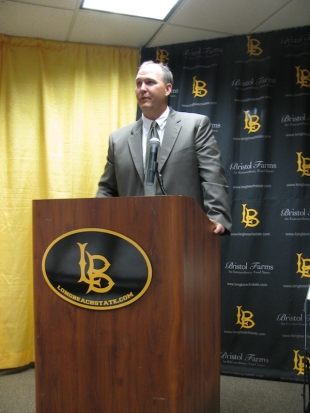 If you were setting your schedule of press conferences for the month of June, you probably wouldn’t have marked the introduction of Troy Buckley as the Dirtbags’ seventh head coach as one to keep your eye on. After all, Buckley signed a contract a year ago that was pretty explicitly setting him up as Mike Weathers’ successor—both Weathers and athletic director Vic Cegles said as much. The university announcement of the press conference to introduce Buckley came like clockwork after Weathers’ final game, a game Weathers essentially let Buckley run. With both Cegles and president F. King Alexander away on other business (Senior Associate Athletics Director Bill Brady handled the prologue duties), it seemed like Tuesday’s presser was fated to be a cut-and-dry efficient transfer of power.
If you were setting your schedule of press conferences for the month of June, you probably wouldn’t have marked the introduction of Troy Buckley as the Dirtbags’ seventh head coach as one to keep your eye on. After all, Buckley signed a contract a year ago that was pretty explicitly setting him up as Mike Weathers’ successor—both Weathers and athletic director Vic Cegles said as much. The university announcement of the press conference to introduce Buckley came like clockwork after Weathers’ final game, a game Weathers essentially let Buckley run. With both Cegles and president F. King Alexander away on other business (Senior Associate Athletics Director Bill Brady handled the prologue duties), it seemed like Tuesday’s presser was fated to be a cut-and-dry efficient transfer of power.
And then Troy Buckley walked to the podium, and his voice cracked in the first sentence he spoke. “This is a big deal,” he said, voice full of emotion. “It means a lot.” Buckley tried to laugh it off, saying, “I tell our players not to be emotional, but here I am.” But the message was clear—expected or not, this was a big deal, both for Buckley, and for the Dirtbags family.
For Buckley, it’s both a professional and a personal state of perfection. Professionally, he’s a head coach for the first time, and at a university he believes in, with a program he helped add a healthy coat of luster to. Personally, Buckley seemed happy at reaching a place of security, and comfort, for he and his children. He had to pause for a lengthy period in talking about how resilient they’ve been through some familial challenges.
For the Dirtbags family, it’s the continuation of a school of thought that’s set the team apart from other colleges. “We are a unique group,” Buckley said, speaking to the team’s fans more than its returning players. “Old school is still the basis of our game.” He spoke at length on the meaning of the Dirtbags legacy, the kind of speech fans were clamoring for after this year’s disappointing finish from a team that didn’t play much of anything that resembled Dirtbags baseball.
“Signing a letter of intent here,” he said, “doesn’t mean you’re a Dirtbag—you have to put the time in.”
After thanking the usual litany—Weathers for his mentorship, his mother and father, the bulk of the athletic department—Buckley laid it on the line. “I wouldn’t have come back from Pittsburgh if I didn’t think we could win…I understand Dirtbags baseball, and I want to get us back to where we need to go.”
That path will likely be familiar—Buckley stressed repeatedly he won’t be implementing any wholesale changes in the regime change. Fans will likely expect the bulk of the improvement to come from recruiting, a portion of the job Buckley has already excelled at. Those same fans can rest assured that the man at the helm will not be taking the job lightly—that much was obvious from his introduction to the public. To Troy Buckley, this job, and his position as caretaker of the school’s most valuable brand, will always be “a big deal.”

